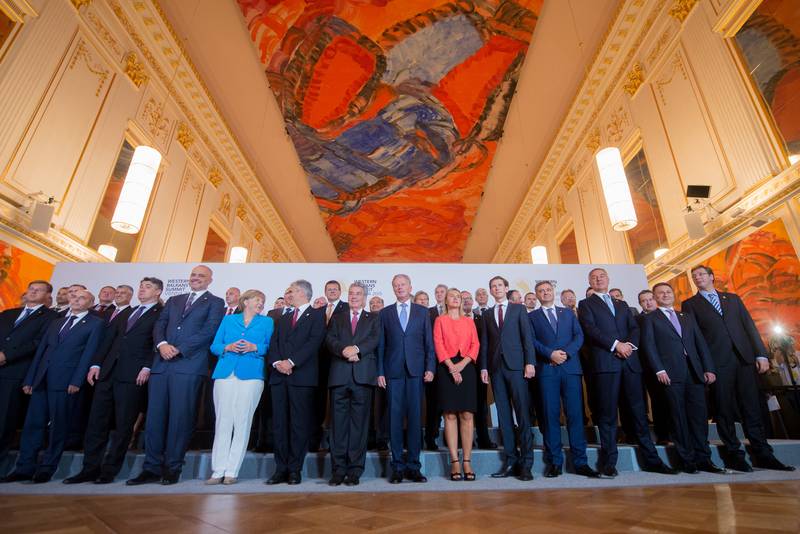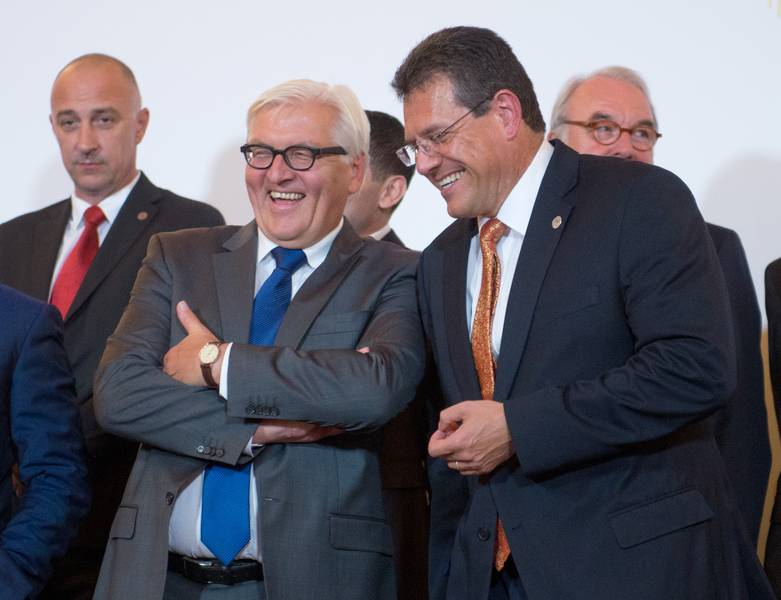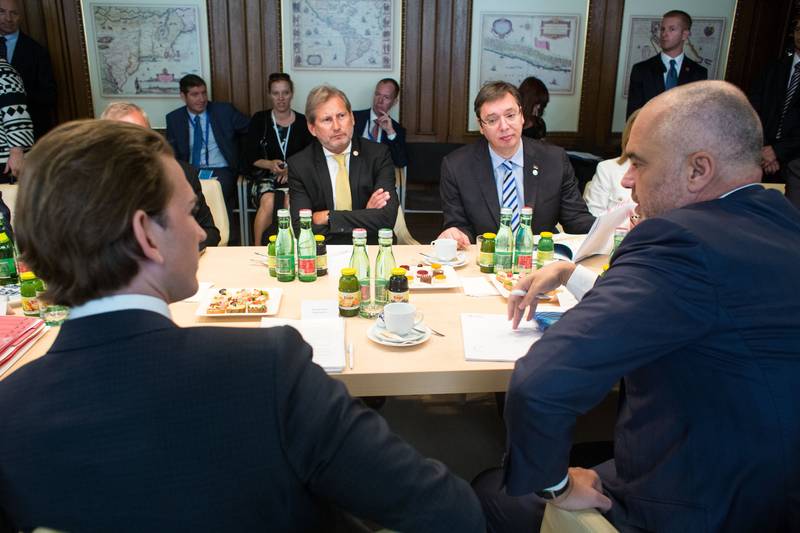It's the Bilateral Relations, Stupid!
Adelina Marini, September 4, 2015
Despite leaving a very bad aftertaste, the second Western Balkans summit held in Vienna last week actually turned out to be quite successful because it brought out the real problems faced by European integration of the Western Balkan countries, namely bilateral disputes and the refugee crisis. The sincere tone, although unpleasant, brought about a certain sobering-up, mainly for the EU and for the placement of the European future of these states on an entirely different foundation. So far, the common impression continues to be of the EU being not too sure as a community of what to do with those states.
To Federica Mogherini, High Representative of the European Union for Foreign Affairs, for example, if the EU fails to find the correct approach to the Western Balkans it will lose them. To the Croatian First Deputy Prime Minister and Minister of Foreign Affairs Vesna Pusić such a thought should never even cross our minds and to Angela Merkel the key to the Western Balkans is Serbia. Three different points of view at the next EU enlargement, posed at the background of the largest refugee crisis in European history since World War II.
Actually, the greatest challenge to both the region and its relationship with the EU are bilateral relations, as this website reported before the August 27 summit. During the last year, bilateral relations between region states, some of which EU members, have gained serious tension, most vivid in the relationship between Belgrade and Zagreb.
Enough puberty already!
This was the focus of Serbian First Deputy Prime Minister and Minister of Foreign affairs Ivica Dačić, who has the position of spokesman for Slobodan Milošević in his professional background. His statement (full recording with simultaneous translation in English available in the attached file) at a press conference before the start of the summit was iconic and deeply controversial. He voiced his satisfaction from the fact that the idea of the Berlin Process has matured to its first anniversary, which says a lot about expectations, at least coming from Serbia, to similar initiatives. Further on, he stated, that Serbia has high expectations for the second summit. Before sharing them, he urged region countries,  names withheld of course, to behave politely not only at fora, such as this one, but in between them as well.
names withheld of course, to behave politely not only at fora, such as this one, but in between them as well.
“I would urge all of us in the Western Balkans to stop acting this way – talk about the future once a year and talk about and return to the past the rest of the year. As you witnessed, over the last few months there were many problems between Balkan states. There were a lot of sharp sentences, so this is exactly why I feel it is important to show everyone that we can function in relatively normal circumstances as well, not just at similar conferences. Possibly, at today’s conference there will be a great display of unity, great interpersonal respect, love, but this will continue to the encounter of the next problem we have between us”, said Mr Dačić. He continued with a certain dose of sarcasm by asking all in the region to behave themselves the rest of the day as if in the presence of teachers.
Serbian first diplomat once more used the example of France and Germany, as well as other Western European countries, which started building the EU just ten years after the end of WWII, “while we are still bickering in the bog of times long gone.” Dačić once more avoided naming a concrete state, but hinted to Croatia by mentioning anniversaries, obviously envisaging the celebrations of the 20-th anniversary of operation Storm in Croatia, which was the reason for the exchange of many sharp words between Belgrade and Zagreb.
Macedonian Foreign Minister Nikola Poposki also stressed in his statement on bilateral problems and urged: “We have to get out of the stereotype that has been developed in Balkan context that membership to the EU signifies that you get a big baseball bat that you can use against those that are meant to join the club before they join it.” He did not mention Greece specifically but, due to Athens’ veto, Macedonia has been unable to start accession negotiations for ten years now, although it has had a candidate country status since 2005. This also led to a significant deterioration in the political and media situation in the country, turned from one of the most-prepared states of the region into a country in need of the EU’s facilitation to solve its internal political problems.
 Germany’s Foreign Minister Frank-Walter Steinmeier urged for saying goodbye to the idea that the EU or individual member states could play a role in the region’s countries. “We can, of course, express our opinion, we can offer support, we can admonish, we can warn, but in the end of the day it is a matter of decisions being taken in the countries themselves, on the ground.” You can see in the final declaration from the meeting that participants have committed to increasing their efforts to resolve bilateral disputes and to refrain from misuse of unresolved issues in the enlargement process. It was also noted that annually, at the summits, there will be monitoring of progress in the resolution of such disputes.
Germany’s Foreign Minister Frank-Walter Steinmeier urged for saying goodbye to the idea that the EU or individual member states could play a role in the region’s countries. “We can, of course, express our opinion, we can offer support, we can admonish, we can warn, but in the end of the day it is a matter of decisions being taken in the countries themselves, on the ground.” You can see in the final declaration from the meeting that participants have committed to increasing their efforts to resolve bilateral disputes and to refrain from misuse of unresolved issues in the enlargement process. It was also noted that annually, at the summits, there will be monitoring of progress in the resolution of such disputes.
In a special addendum to the declaration, the participating states declared they would not block or encourage others to block the progress of their neighbours. They urge the governments of neighbouring EU member states to join this agreement. The appeal is obviously aimed at Greece and Bulgaria, which have unsolved issues with Macedonia, but did not attend the conference. Their inclusion was asked for also by Ivica Dačić and Nikola Poposki.
Serbia is at the centre of the Western Balkans enlargement
At the eve of the Vienna meeting four key agreements were signed in Brussels between Serbia and Kosovo, who were the “star” of the summit. A long-awaited agreement was reached about the municipalities in Kosovo that have large Serb majorities; a telecoms plan was agreed on, as well as an energy agreement, and freedom of movement along the Mitrovica bridge. Kosovo received for the first time its own international dialling code. At the final press-conference on the afternoon of August 27 the summit’s initiators appeared – German Chancellor Angela Merkel and the host Werner Faymann - Commissioner for Enlargement Negotiations Johannes Hahn (Austria, EPP), and Federica Mogherini, High Representative of the European Union for Foreign Affairs. On the Western Balkans side the only representative was Prime Minister Aleksandar Vučić.
While Ms Mogherini was praising Serbia and Kosovo for the agreements, signed two days before, Angela Merkel was looking at Vučić and smiling encouragingly. He, in his turn, thanked for the attention that the region was receiving and assured that at the moment a process of change in Balkan mentality was underway. “And the mentality that is willing to kick the bucket for some short term political gains, the mentality that we can play games and good life will fall on us from the sky, the mentality that the state is responsible for everything and the individual's responsible for nothing”, explained Mr Vučić. He spoke for the entire region. To Serbia, the satisfaction in Vienna was reason enough to ask for immediate opening of the first two negotiations chapters. Here, however, Belgrade clashed with Germany’s reserve.
Ms Merkel stated that this is truly a good foundation for opening of the first chapters, but noted that an analysis should be waited for. In other words, they’d have to see if the signed agreements will be enforced. It is of extreme importance to Germany that relations between Belgrade and Pristina are normalised, and right after that comes the work on establishing rule of law. One thing became clear at the Vienna summit – the latter falls prey to the need for stability in the region, especially at the background of the refugee wave. Croatian Minister of Foreign Affairs Vesna Pusić is of the exact opposite opinion.  She thinks Serbia has to begin negotiations as soon as possible, for this is the only way it would begin to address certain issues.
She thinks Serbia has to begin negotiations as soon as possible, for this is the only way it would begin to address certain issues.
The next Western Balkans meeting will be next year in France. According to Ms Mogherini, regardless of this not being a “purely EU initiative, it is in support of the EU path of the Western Balkans countries”. This is the exact reason why it is important that the EU is more unanimous in the signals it is sending to them and should clear any doubt that it is using double standards, especially in solving bilateral disputes. Whether other states, and which ones, will join the initiative will show how important the Western Balkans region really is to the EU, especially to its neighbouring member states. The presidents of Slovenia and Croatia, Borut Pahor and Kolinda Grabar-Kitarović, handed a letter to the President of the European Council Donald Tusk in which they ask for a summit of the EU and the South-Easter Europe to be held. Let’s hope this proposal is accepted. In the meantime, the EU has to continue to help where it can, like it does in Bosnia and Herzegovina, Kosovo/Serbia, and in Macedonia, but it should also acknowledge where it is in the way.
Translated by Stanimir Stoev
 Bakir Izetbegovic, Andrej Plenkovic | © Council of the EU
Bakir Izetbegovic, Andrej Plenkovic | © Council of the EU Aleksandar Vucic, Recep Tayyip Erdogan | © Serbian Presidency
Aleksandar Vucic, Recep Tayyip Erdogan | © Serbian Presidency Jean-Claude Juncker, Zoran Zaev | © European Commission
Jean-Claude Juncker, Zoran Zaev | © European Commission